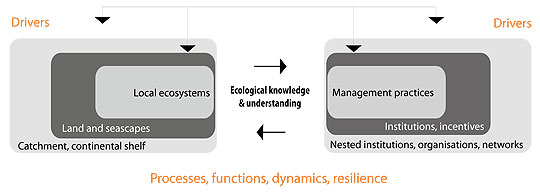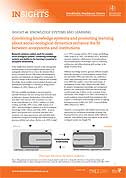Insight #6 Knowledge systems and learning

Combining knowledge systems and promoting learning about social-ecological dynamics enhance the fit between ecosystems and institutions.
Blueprint solutions seldom work for complex social-ecological systems. Combining knowledge
systems and platforms for learning is essential in ecosystem stewardship.
The best available knowledge is not just found in scientific literature, but also among local stewards such as fishermen, farmers, birdwatchers, urban dwellers and others who interact with ecosystems on a day-to-day basis (Barthel et al. 2010, Colding et al. 2006,Colding and Folke 2009, Crona 2006, Schultz et al. 2007).
Different knowledge systems generate different insights about the dynamics of social-ecological systems (Ernstson and Sörlin 2009), and when they are combined, a richer, often surprising picture may emerge (Carpenter et al. 2009) that enables a more fine-tuned design of management (Crona 2006, Olsson and Folke 2001).
Key findings
1. In practice, the combination of knowledge systems requires platforms for learning, where actors can exchange information and develop a shared understanding of the system.
2. Combining knowledge systems can create conflict and tension, and needs skilled facilitation and careful design of the learning platform.
3. Complex problem solving benefits from a diverse team of competent individuals.
4. In education for sustainability it is not sufficient to learn about ecosystems. It is just as important to gain and integrated knowledge about society and the various roles of people as consumers, voters and citizens.
5. Knowledge about complex social-ecological systems is always incomplete.
6. Local stewards hold fine-grain knowledge about ecosystems and social-ecological interactions.
7. Local ecological knowledge is embedded in social-ecological memory.
8. New information and communication technologies are revolutionizing the generation of and access to ecological data.

Management and governance of social-ecological systems needs to be ecologically informed. Ecological knowledge and understanding helps reconnect management practice, networks and institutions to stewardship of ecosystem (Berkes and Folke 1998).








